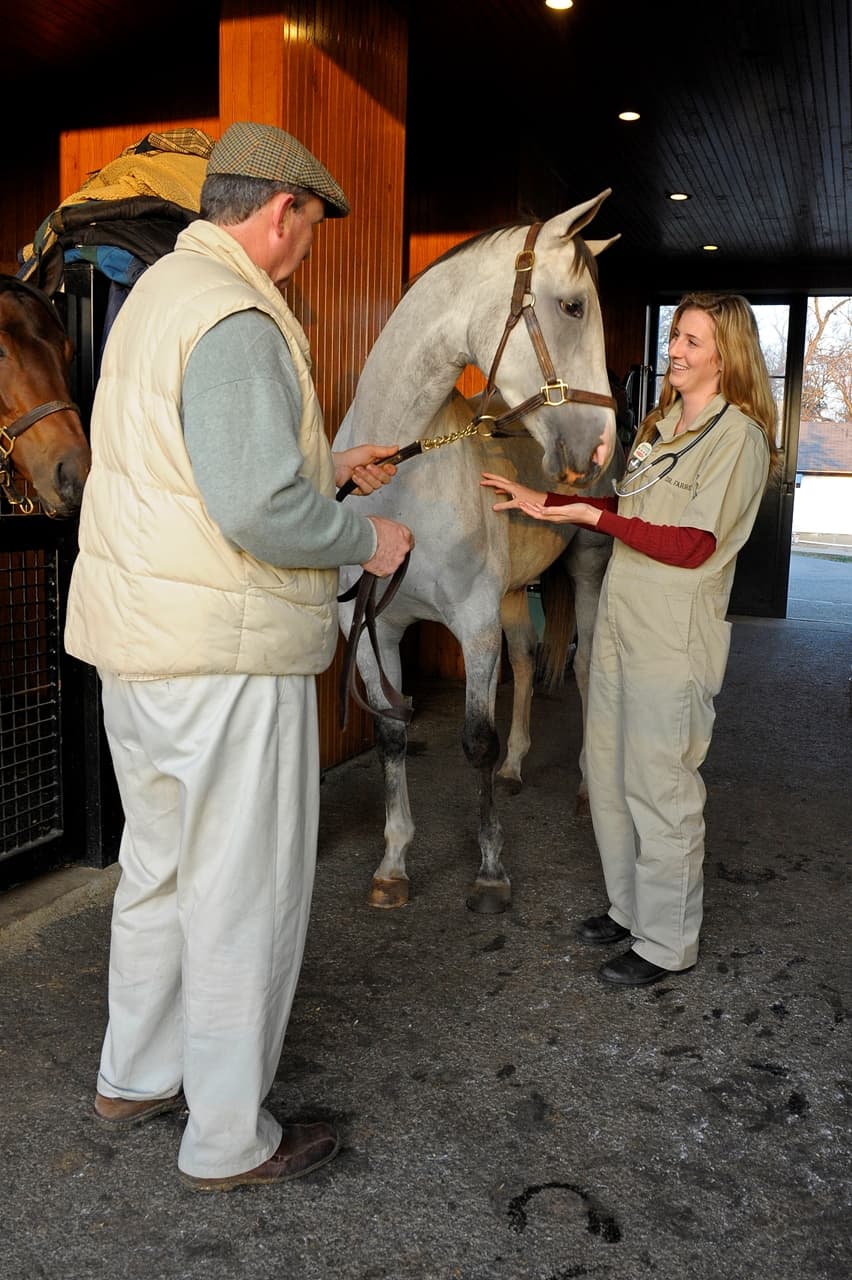Fall Wellness Exams for Horses

For most of us fall is the time of year we switch training programs with the change of seasons, and there is a slight break in our riding and showing routines. We have time to reflect on the past few months and decide what the next few will hold. This is a great time for veterinarians perform fall wellness exams for horses, including but not limited to a physical exam, an oral exam, vaccinations, and/or a lameness exam.
A physical exam is necessary to assess your horse’s overall health. And the fall season is a good transition period to address any health concerns your horse developed over the past year. A veterinarian should listen to your horse’s heart, lungs, and GI tract. He or she should also evaluate your horse’s weight to determine whether he has put on a few pounds due to summer grass or lost some while in heavy work. Depending on the exam your veterinarian performs, he or she might suggest doing bloodwork to fully evaluate your horse’s health. A CBC (complete blood count) allows your veterinarian to check for conditions such as anemia, infection, or inflammation and to evaluate platelet numbers. He or she might also run a blood chemistry test and fibrinogen (soluble plasma protein) concentration estimate to evaluate liver enzymes, kidney function, and overall electrolytes and protein values. Fibrinogen levels help the veterinarian assess the horse’s overall inflammatory state and reveal if the condition is chronic or acute and how severe it might be. Any condition that affects the CBC, blood chemistry, or fibrinogen concentration affects your horse’s overall health and performance.
Fall is also a great time to perform a fecal exam on all horses on the property to determine the need to deworm or if the dewormer currently being used is effective. Talk to your veterinarian about a fecal exam program designed specifically for your horse and property.
An oral exam allows the veterinarian to determine whether your horse’s teeth need floating. Weight loss, poor performance, unwillingness to accept training aids, and/or new, unwanted behavior could be caused by malocclusions (misalignments) of the teeth. Sharp points on the grinding surface of the molars cause a horse to not want to eat grain and poorly grind up the grain prior to swallowing. This leads to weight loss and lack of energy, which consequently leads to poor performance. Small hooks on the back molars (that you won’t be able to see unless the horse is sedated) or hooks on the front molars (that you can see with a quick look in the mouth) can cause pinching of the cheeks or gums and can lead to head tossing under saddle, attitude changes when riding, unwillingness to flex at the poll, or reluctance to take the bit. All horses should have an oral exam once a year to determine the need for a float.
Vaccinations are essential for the complete health of the horse. Each area of the country has a slightly different concern with respect to frequency and timing of vaccination, but core vaccines are the same for all horses: Eastern/Western equine encephalitis, tetanus, West Nile virus, and rabies.
Consider adding a lameness exam to fall wellness exams for horses. Subtle lamenesses or gait abnormalities caught early can allow the veterinarian to intervene and possibly correct or cure a problem. A basic exam on a hard surface, asking your horse to walk and jog in a straight line away from and back to the veterinarian, is a great opportunity to evaluate your horse’s gaits, hoof conformation, and trimming. Poor foot conformation can lead to early arthritis in the affected limb or compensation injuries in other limbs. If your horse usually gears up for fall competitions, now is a great time to make sure he is at his peak condition and soundness. Joint injections, joint/hoof supplements, and injections of joint protective agents such as Adequan (polysulfated glycosaminoglycan) or Legend (hyaluronic acid) might improve your horse’s comfort. Fall is also a good time to evaluate your riding and conditioning program to prepare your horse for the months to come.
Written by:
Heather Farmer, DVM
Related Articles
Stay on top of the most recent Horse Health news with















